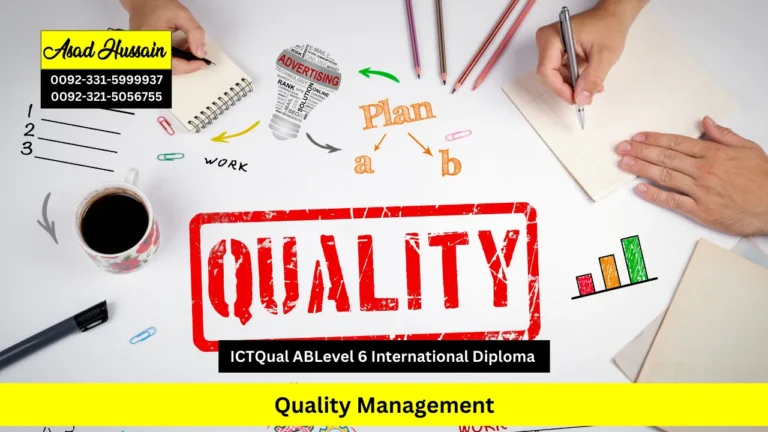Civil engineering is an ever-evolving field, playing a crucial role in shaping the infrastructure that supports society’s growth. Whether it’s designing bridges, roads, or innovative urban spaces, the demand for skilled civil engineers continues to rise globally. One such credential that stands out for aspiring civil engineers is the ICTQual Level 5 Diploma in Civil Engineering, a comprehensive qualification designed to provide both theoretical knowledge and practical skills.
The ICTQual Level 5 Diploma in Civil Engineering is a specialized qualification that offers a robust foundation in civil engineering principles, preparing students for a successful career in the industry. This 240-credit qualification typically spans over two years, offering an in-depth curriculum that covers a wide range of topics, from the basics of engineering mathematics to advanced structural analysis and project management.
The ICTQual Level 5 Diploma in Civil Engineering is a comprehensive, flexible, and practical qualification that prepares students for a successful career in the dynamic and fast-growing civil engineering industry. With a robust curriculum, strong industry links, and a focus on both academic learning and practical skills, this qualification offers a solid foundation for anyone looking to make their mark in the construction and infrastructure sectors.
Program Highlights
Year 1:
- Engineering Principles and Applications
- Mathematics for Civil Engineers
- Structural Mechanics
- Materials Science and Technology
- Geotechnical Engineering
- Hydraulics and Fluid Mechanics
- Surveying and Measurement Techniques
- Engineering Drawing and CAD
- Construction Technology
- Project Management for Engineers
- Advanced Structural Analysis
- Environmental Engineering
Year 2:
- Transportation Engineering
- Construction Management and Law
- Water Resources Engineering
- Building Information Modeling (BIM)
- Advanced Geotechnical Engineering
- Structural Design in Concrete and Steel
- Risk Management in Civil Engineering Projects
- Sustainable Construction Practices
- Advanced Hydraulics and Fluid Flow
- Urban Infrastructure and Development
- Smart Cities and Technology in Civil Engineering
- Capstone Project and Dissertation
To enroll in the ICTQual Level 5 Diploma in Civil Engineering (240 Credits – 2 Years), candidates must meet the following entry requirements:
- A minimum of a Level 3 qualification, such as A-Levels, NVQ Level 3, or an equivalent qualification, along with at least one year of relevant experience. Alternatively, a Level 4 qualification in a related field (e.g., mathematics, physics, engineering, or a science-based discipline) is also acceptable. A strong background in mathematics and basic engineering concepts is highly recommended, as the course delves into advanced civil engineering topics.
- Candidates must be at least 18 years old to enroll in the program.
- Proficiency in English is required, as the course involves technical terminology, written assignments, and effective communication within civil engineering contexts.
- A basic understanding of mathematics and physics is essential, as these subjects are foundational for problem-solving, structural analysis, and grasping key engineering principles in civil engineering.
- While not mandatory, prior experience or exposure to civil engineering projects, construction work, or engineering technologies can provide a helpful foundation for understanding the course material and enhancing practical learning outcomes.
Below are the learning outcomes for each of the study units in the ICTQual Level 5 Diploma in Civil Engineering program:
Year 1: Foundation and Core Knowledge (120 Credits)
1. Engineering Principles and Applications
- Learning Outcomes:
- Understand and apply fundamental engineering principles to real-world civil engineering problems.
- Demonstrate knowledge of mechanics, thermodynamics, and fluid dynamics within engineering contexts.
- Solve basic engineering problems using analytical techniques.
2. Mathematics for Civil Engineers
- Learning Outcomes:
- Apply mathematical methods, including calculus, algebra, and statistics, to solve complex civil engineering problems.
- Analyze and interpret mathematical data in the context of civil engineering projects.
- Use advanced mathematical tools to support structural and systems analysis.
3. Structural Mechanics
- Learning Outcomes:
- Analyze the behavior of structures under various loads using engineering principles.
- Apply concepts such as bending, shear, torsion, and axial forces to structural analysis.
- Design simple structural elements with appropriate load considerations.
4. Materials Science and Technology
- Learning Outcomes:
- Understand the properties and behavior of materials used in civil engineering, including concrete, steel, and composites.
- Evaluate the durability and strength of materials in various environmental conditions.
- Select and apply appropriate materials for different civil engineering applications.
5. Geotechnical Engineering
- Learning Outcomes:
- Understand the principles of soil mechanics and how they impact foundation design.
- Conduct basic site investigations, including soil testing and analysis.
- Apply geotechnical principles in the design of foundations and soil improvement techniques.
6. Hydraulics and Fluid Mechanics
- Learning Outcomes:
- Demonstrate knowledge of fluid mechanics and its applications in civil engineering systems.
- Design basic hydraulic structures like canals, dams, and drainage systems.
- Apply principles of fluid flow to water distribution and management systems.
7. Surveying and Measurement Techniques
- Learning Outcomes:
- Use surveying instruments and techniques to measure distances, levels, and angles on construction sites.
- Interpret and create survey maps, drawings, and reports.
- Apply surveying data in the planning and design of civil engineering projects.
8. Engineering Drawing and CAD
- Learning Outcomes:
- Produce technical drawings following engineering standards.
- Use computer-aided design (CAD) software to create and modify civil engineering designs.
- Apply drawing and modeling techniques to represent civil engineering projects accurately.
9. Construction Technology
- Learning Outcomes:
- Understand the construction methods, techniques, and technologies used in civil engineering projects.
- Identify construction materials, tools, and equipment relevant to civil engineering tasks.
- Apply construction technology in site preparation, excavation, and material handling.
10. Project Management for Engineers
- Learning Outcomes:
- Apply project management techniques to civil engineering projects, including scheduling, budgeting, and resource allocation.
- Manage project risks, quality control, and ensure compliance with standards.
- Collaborate effectively in multidisciplinary teams to complete engineering projects on time and within budget.
11. Advanced Structural Analysis
- Learning Outcomes:
- Use advanced analytical techniques, such as finite element analysis (FEA), to assess complex structures.
- Analyze and design large-scale civil engineering structures under dynamic loading conditions.
- Apply software tools for modeling and simulating structural behavior.
12. Environmental Engineering
- Learning Outcomes:
- Assess the environmental impacts of civil engineering projects, including waste management, water treatment, and pollution control.
- Apply sustainable practices to reduce the environmental footprint of engineering designs.
- Design infrastructure solutions that contribute to environmental protection and sustainability.
Year 2: Advanced Applications and Specialization (120 Credits)
13. Transportation Engineering
- Learning Outcomes:
- Design and plan transportation infrastructure such as roads, railways, and airports.
- Apply principles of traffic flow, safety, and capacity to transportation systems.
- Evaluate environmental and economic impacts of transportation projects.
14. Construction Management and Law
- Learning Outcomes:
- Understand the legal and regulatory framework that governs civil engineering projects.
- Apply construction management principles to oversee project timelines, costs, and quality.
- Manage contracts, health and safety regulations, and dispute resolution in construction projects.
15. Water Resources Engineering
- Learning Outcomes:
- Design and manage water resources systems, including flood control, stormwater management, and water treatment.
- Assess and mitigate the environmental impacts of water infrastructure.
- Apply hydrological modeling and analysis in water resource planning and management.
16. Building Information Modeling (BIM)
- Learning Outcomes:
- Apply Building Information Modeling (BIM) principles and tools to design, manage, and optimize civil engineering projects.
- Collaborate in multidisciplinary teams using BIM to improve project coordination and reduce inefficiencies.
- Understand the role of BIM in managing construction data, schedules, and resources.
17. Advanced Geotechnical Engineering
- Learning Outcomes:
- Analyze complex geotechnical problems, including slope stability, foundation design, and soil-structure interaction.
- Apply advanced geotechnical techniques in the design of tunnels, deep foundations, and earthworks.
- Use software tools for geotechnical modeling and analysis.
18. Structural Design in Concrete and Steel
- Learning Outcomes:
- Design reinforced concrete and steel structures, ensuring safety, stability, and compliance with building codes.
- Apply advanced design principles to optimize structural systems.
- Analyze and select appropriate materials and construction methods for different structural types.
19. Risk Management in Civil Engineering Projects
- Learning Outcomes:
- Identify and assess risks in civil engineering projects, including financial, safety, and environmental factors.
- Develop strategies to mitigate risks and manage uncertainties in project execution.
- Apply risk management techniques to ensure project success.
20. Sustainable Construction Practices
- Learning Outcomes:
- Implement sustainable construction practices, including the use of eco-friendly materials and energy-efficient designs.
- Evaluate the environmental impact of construction methods and promote waste reduction.
- Integrate sustainability into the planning and execution of civil engineering projects.
21. Advanced Hydraulics and Fluid Flow
- Learning Outcomes:
- Solve complex hydraulic problems involving fluid flow, pressure, and velocity in civil engineering systems.
- Design and optimize water management systems such as dams, reservoirs, and stormwater drainage networks.
- Apply advanced fluid dynamics principles in the analysis of water infrastructure projects.
22. Urban Infrastructure and Development
- Learning Outcomes:
- Plan and design urban infrastructure systems, including roads, utilities, and public spaces.
- Analyze the impact of urban development on environmental, social, and economic systems.
- Apply civil engineering principles to manage the growth and development of cities.
23. Smart Cities and Technology in Civil Engineering
- Learning Outcomes:
- Understand the role of emerging technologies such as IoT, sensors, and data analytics in smart city infrastructure.
- Apply technology to improve urban planning, transportation, and sustainability in civil engineering projects.
- Collaborate with stakeholders in the development of smart city initiatives.
24. Capstone Project and Dissertation
- Learning Outcomes:
- Conduct independent research on a civil engineering topic, applying principles and methodologies learned throughout the course.
- Present a comprehensive solution to a real-world civil engineering problem, demonstrating critical thinking, analysis, and innovation.
- Communicate complex engineering ideas clearly through written and oral presentations, contributing to professional development.
The ICTQual Level 5 Diploma in Civil Engineering (240 Credits – Two Years) is designed for individuals aiming to advance their careers in civil engineering. This course is ideal for:
- Aspiring Civil Engineers: Individuals seeking to build a professional career in civil engineering, gaining the knowledge and skills necessary to manage complex engineering projects.
- Experienced Civil Engineering Technicians/Professionals: Those already working in civil engineering who wish to enhance their qualifications, skills, or progress to senior or managerial positions.
- Career Changers: Individuals with a background in construction, engineering, or technology who want to transition into civil engineering.
- Engineering Graduates: Those with a relevant engineering qualification (e.g., diploma or degree) looking to specialize further in civil engineering.
- Those Planning to Pursue Higher Education: Individuals intending to use this qualification as a stepping stone toward a university degree in civil engineering or related fields.
- Managers and Supervisors in the Construction Industry: Professionals currently managing projects who want to formalize their knowledge of civil engineering and improve their expertise in engineering practices, project management, and operations.







